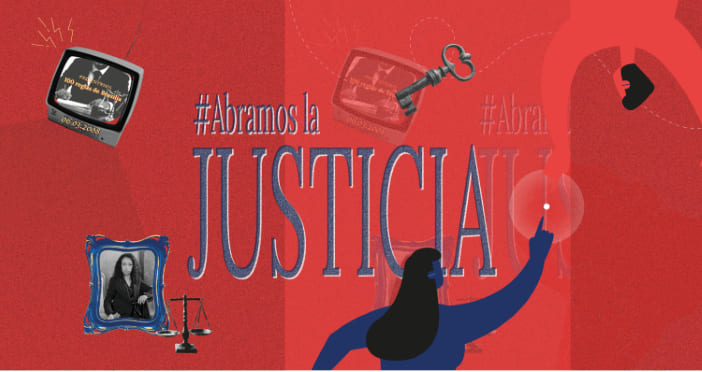The main justice networks, the Ibero-American Association of Public Prosecutors (AIAMP) and Inter-American Association of Public Defenders (AIDEF), the international organisation the Conference of Ministers of Justice of the Ibero-American Countries (COMJIB) and the Ibero-American Judicial Summit, from more than 20 countries, come together in a campaign promoted by the FIIAPP (Spanish Cooperation) through the European Union’s EUROsociAL+ programme to promote access to justice by driving an international agreement forward that makes the 100 Brasilia Rules binding.

All people are equal before the law, but do they always have the same access to justice? The answer is no. Not yet. Indigenous peoples, migrants, people with disabilities, in remote environments or women victims of gender-based violence, among other groups, often encounter serious limitations in getting to know their rights, going to court, defending themselves or filing and securing complaints, among other things. Language that is too technical, the lack of translation services into indigenous languages, ignorance of their own rights, insurmountable physical distances or simply fear and mistrust are just some of the most common obstacles that prevent these groups from effectively accessing public justice systems in Latin America.
“There is little or no use for the State formally recognising a right if its holder cannot effectively access the justice system for protection of said right. And obviously the difficulties are greater when it comes to people in vulnerable conditions,” explains Stella Maris Martínez, AIDEF General Coordinator and Ombudsman of Argentina.
People living in poverty, children and adolescents, the elderly, migrants, people with disabilities, LGTBI groups, native peoples, women victims of gender violence and people in custody are the main recipients of the Brasilia Rules.
“The 100 Rules promote measures as basic as the active participation of public servants in disseminating knowledge about the rights of people in disadvantaged areas. Some of the standards promoted are free legal assistance, easy-to-handle forms, orality and understanding of judicial proceedings; also, measures to bring the service closer to remote places or alternative measures for conflict resolution”, declares Judge Angela Russo, member of the 100 Brasilia Rules’ Follow-up Commission of the Ibero-American Judicial Summit
“Public Prosecutor’s Offices of Ibero-America have firmly committed themselves to eliminating inequity and inequality in access to justice. In a coordinated and complementary effort, the region’s prosecutors’ and defenders’ offices have focused on improving the protection and assistance provided to victims and witnesses, because part of democratic legitimacy is that citizens understand their justice system, understand their rights and feel included in this process. The risks of making the most vulnerable invisible are high in contexts of high inequality, hence the relevance of our duty,” said the chairman of the Ibero-American Association of Public Prosecutors and the National Prosecutor of the Public Prosecutor’s Office of Chile, Jorge Abbott.
“The 100 Brasilia Rules were updated in 2018, but today we must go further, focusing justice on people and ensuring that the rules are not only conceptual frameworks of reference. We have an immense challenge, which is to deploy a strategy that facilitates the organisation of National Plans for Access to Justice in the countries of Ibero-America,” said Paola Andrea Jhon Martínez, Deputy Secretary General of COMJIB.
For Anna Terrón, director of the FIIAPP, which has promoted the formulation of these regulations through the EUROsociAL+ programme, “access to justice is a key right for the realisation of other rights and must be at the centre of international cooperation between public institutions: the exchange of experiences is and will be an accelerator for the effective implementation of the 100 Brasilia Rules”
The Valparaíso Declaration: the pandemic has made it more urgent to open up justice
The judicial networks agree that the pandemic has aggravated the difficulties in accessing justice for the most vulnerable groups. This was stated in the Valparaíso Declaration signed on 14 January during a meeting of the EUROsociAL+ programme. “Especially pressing is the case of women and girls, since the pandemic has intensified violence against them both inside and outside the home, multiplying the obstacles they have to overcome to reach the justice services or enable the application of protection measures. This situation makes specific measures for them more necessary than ever within the formal justice system, but also through other alternative conflict resolution or restorative justice mechanisms,” said Paola Andrea Jhon Martínez, Deputy Secretary General of the Conference of Ministers of Justice of the Ibero-American Countries (COMJIB). On the other hand, although the pandemic has accelerated the use of technology, in many cases achieving more agile justice, “the use of technological means can also have a negative impact on access to justice for some sectors of the population: the digital divide is an additional gap that must be addressed urgently”, stated Xavier Armendáriz Salamero, Deputy National Prosecutor with the Public Prosecutor’s Office of Chile and representative of the Presidency of the Ibero-American Association of Public Prosecutors (AIAMP).
Carlos Mora Jano, National Defender of Chile and Secretary General of the Inter-American Association of Public Defenders (AIDEF) also highlighted the special needs of migrants and refugees: “In recent years, the need for effective mechanisms of access to justice for populations in situations of mobility has increased exponentially at a time of mass migration in the region unprecedented in the last century.”
A simultaneous campaign in more than 20 countries and in channels belonging to the main justice institutions
Under the hashtag #AbramosLaJusticia (OpenUpJustice), the campaign will take place from 22 to 27 February with an animated video with testimonies from vulnerable people and the voices of prosecutors, defenders and magistrates in 23 countries. The objective: to create awareness about the challenges of access to justice and about the need to promote an international agreement that can deal with them.



